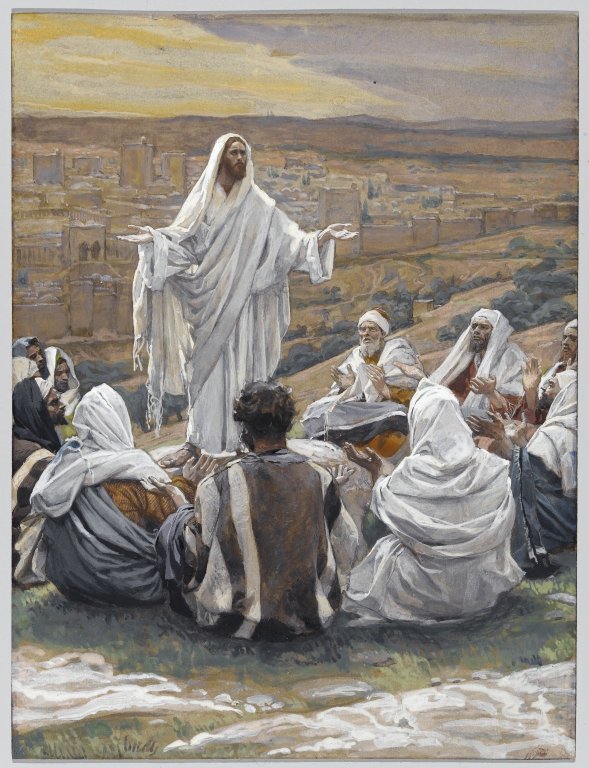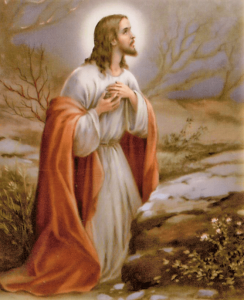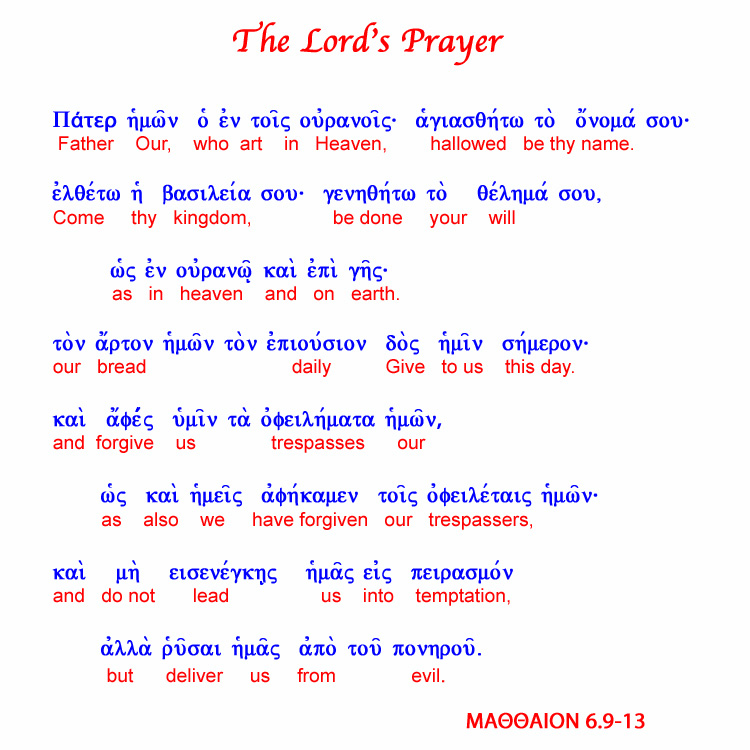
Prayer is the opening of one’s heart and soul in a conversation with God, and thus is an expression of faith in a relationship with God. Jesus himself prayed often, as noted in the Gospel of Luke – before his Baptism (3:21), after healing the sick (5:16), before choosing the Twelve Apostles (6:12), before the Confession of Peter (9:18) and the Transfiguration (9:28), before the giving of the Lord’s Prayer (11:1), and to his Father in the Garden of Gethsemane (22:40-42). Jesus teaches us to pray: “All that you ask for in prayer, believe that you will receive it and it shall be yours” (Mark 11:24).
Jesus in the Sermon on the Mount and throughout the New Testament continues the tradition of prayer found in the Old Testament of the Bible, exemplified by the Patriarchs of Israel such as Abraham, Isaac, Jacob, Moses, and David. Prayer is the way God has guided his people throughout history. Humility is the foundation of prayer, as we learn in the parable of the Pharisee and the tax collector (Luke 18:9-14). Examples of prayer in the Bible include the Psalms, Matthew 7:7, Matthew 18:20, Luke 1:46-55, John 17:11, Philippians 4:6, and James 5:14.
Prayer at home with the family is the first place to educate children in prayer! Forms of prayer include Adoration and Praise, Petition, Intercession, and Thanksgiving. There are three kinds of prayer: Vocal, Meditative, and Contemplative. Vocal prayer is the form of prayer in groups, as in Church. Meditation is a quest to understand the Christian life, in order to respond to what the Lord is asking. One may meditate on the Bible or the Rosary or other holy pursuits. One meditates in order to discern and come to the light: “Lord, what do you want me to do?” The Carmelite St. Teresa of Avila calls contemplative prayer a “close sharing between friends,” a conversation with God in our hearts. Remember to be loving and thoughtful in your prayer with the Lord!
And listen in silence after you pray – you may receive an answer!
The ideal prayer is the one Christ Jesus taught us, the Lord’s Prayer, the Our Father:
Matthew 6:9-13 and a brief version in Luke 11:2-4.
All Christian faiths say the Lord’s Prayer.
The Lord’s Prayer
Our Father who art in heaven,
hallowed be thy name.
Thy kingdom come.
Thy will be done on earth as it is in heaven.
Give us this day our daily bread,
and forgive us our trespasses, as we forgive those who trespass against us,
and lead us not into temptation, but deliver us from evil.
The Gospel of St. Matthew 6:9-13
The Our Father
In response to his disciples’ request “Lord, teach us to pray,” Jesus gives them the fundamental Christian prayer, the Our Father, the prayer of hope. “The Lord’s Prayer” means that the prayer to our Father is taught and given to us by the Lord Jesus. Jesus presents himself as our model, and invites us to become his disciples and follow him; in humbling himself, he has given us an example to imitate. The New Covenant practices almsgiving, prayer, and fasting; its prayer is the “Our Father.” The Lord’s Prayer is essential to the liturgy of the Church, for it is an integral part of the Mass or Divine Liturgy and the Sacraments of Baptism and Confirmation. The Lord’s Prayer is truly a summary of the whole Gospel. All the Scriptures are fulfilled in Christ.

Our Father Who Art in Heaven
What a blessing to call God our Father! We can call God our “Father” because he is revealed to us by his Son Christ Jesus who became man. Through Baptism we are adopted as Children of God. The free gift of adoption requires on our part continual conversion and a new life. Praying to our Father should develop in us two fundamental dispositions: first, the desire to become like him, and second, a humble and trusting heart. “Who art in heaven” does not mean space but a way of being, that he is majestic and transcends everything we can conceive of his holiness. The Father is in heaven, his dwelling place, our homeland to which we aspire.
The Church Father St. Augustine noted seven petitions in Matthew’s version of the Lord’s Prayer, the first three theological for the glory of the Father, which draw us towards him, and the last four present our wants to him and request his grace. The first series of petitions carry us toward him, for his own sake: thy name, thy kingdom, thy will. It is characteristic of love to think first of the one whom we love. The second series of petitions are an offering up of our hopes.
Hallowed Be Thy Name
The term “to hallow” means to recognize as holy, to treat in a holy way. St. Gregory of Nyssa, a Church Father in Cappadocia in Asia Minor, wrote around 380 AD that “of all good things the most important for me is that God’s name should be glorified in my life.” If we truly hallow the Father, then we respect him in our hearts, and so enter into God’s plan for us and our salvation. The sanctification of God’s name in the world and our own salvation depends on our life and prayer.
Thy Kingdom Come
The Kingdom of God is brought near in the Word Incarnate, and it has come in the Paschal Mystery of Christ – his Passion, death, Resurrection, and Glorious Ascension. The Kingdom of God is in our midst in the Eucharist. “Thy kingdom come” in the Lord’s Prayer refers primarily to the final coming of the reign of God through Christ’s return. This second petition prays for the growth of the kingdom of God in the “today” of our lives, bearing the fruit of new life in the Eight Beatitudes of Jesus.
Of great interest, a rare variant of Luke 11:2 in the earliest Greek manuscripts reads instead “May the Holy Spirit come upon us and purify us!”
Thy Will be done on Earth as it is in Heaven
St. Ignatius of Antioch, in his Letter to the Ephesians 7:2, was the first Apostolic father to refer to Jesus Christ as the Physician. St. Gregory of Nyssa continues this concept in his sermon on this phrase: “Therefore the true Physician of the diseases of the soul, who shared the life of man for the sake of those who were sick, gradually weakens the cause of disease through the thoughts contained in the prayer and so restores us to spiritual health.” When we say thy will be done, we ask that God’s will be done within us, to offset our weak nature, a nature given to concupiscence and temptation.
God’s expression of his will is the commandment that “you love one another, even as I have loved you” (John 13:34). This commandment summarizes all the others and expresses his entire will. We ask for God’s loving plan to be fully realized on earth as it already is in heaven. Through prayer we can discern what is the will of God and obtain the endurance to do it. May we learn obedience!
Give us this Day our daily Bread
The original Greek Bible has the Imperative of Entreaty expressed in all of these petitions; in other words, the word please is implied. “Give us” expresses in communion with our brethren our filial trust in our heavenly Father and the covenant between the Father and all men. The Father who gives us life gives us “our bread,” the nourishment life requires, both material and spiritual. Jesus teaches us to pray, “Ask and it will be given to you, seek and you will find, knock and the door will be opened to you” (Matthew 7:7). The Greek word epiousios for “daily” appears only in the Lord’s Prayer and literally means “superessential,” which refers directly to the Bread of Life, the Body of Christ.
The presence of world hunger calls Christians to exercise responsibility and justice for the poor, to share with love our spiritual and material goods. This petition also addresses the spiritual famine of the world, and the Christian is to proclaim the good news to the poor, the Bread of Life: the Body of Christ received in Communion.
And forgive us our trespasses, as we forgive those who trespass against us.
In this petition we return to Him as a prodigal son and begin our confession as sinners and need of mercy. The Penitential Psalms are beautiful expressions of a repentant heart. Humility will allow us to say like the tax collector, “O God, be merciful to me a sinner” (Luke 18:13). Our hope is firm, for in his Son we have redemption, the forgiveness of sins. There is a condition here: this mercy can only fill our hearts if we have forgiven those who have trespassed against us! Remember the verses that follow the Our Father in Matthew: “For if you forgive men their trespasses, your heavenly Father will also forgive you. But if you do not forgive men their trespasses, neither will your Father forgive your trespasses” (Matthew 6:14-15). Wouldn’t it be a blessing if we could forgive like Jesus: “Father, forgive them, for they know not what they do” (Luke 23:34). Pope John Paul II reminds us: “Forgiveness is the key to peace!”
And lead us not into temptation, but deliver us from evil.
These related petitions are nearly identical. The first part asks God not to allow us to take the path that leads to sin. God does not tempt anybody (James 1:13). Both Job (1:6-2:10) in the Old Testament and Jesus himself (Matthew 4:1-11) in the New Testament were tempted by the devil! This petition implores the Spirit for discernment and strength in the battle between flesh and spirit. The Holy Spirit makes us discern between trials, necessary for the growth of the inner man, and temptation, which leads to sin and death. Discernment unmasks the lie of temptation. This petition also requests the grace of vigilance and final perseverance. This prayer implores God not to allow us to be tested beyond our strength, as St. Paul reassures us, “God is faithful, who will not allow you to be tempted beyond what you are able, but with the temptation will provide the way of escape also, so that you will be able to endure it” (First Corinthians 10:13).
In the last petition to our Father, we pray in communion with the Church for the deliverance of the entire human family. Evil is not an abstraction but a person, satan, the evil one, the deceiver of the whole world. Victory over the prince of this world was won once and for all at the Hour when Jesus freely gave himself up to death to give us his life. Along with the deliverance from the evils that overwhelm humanity, the Church implores the precious gift of peace and the grace of perseverance in expectation of Christ’s return.
For Thine is the Kingdom, and the Power, and the Glory, forever. Amen.
Early manuscripts of the Gospel of Matthew do not contain this phrase, but a form is found in the Didache (written circa 100 AD), the Byzantine Divine Liturgy of St. John Chrysostom, the Catholic Mass, and the Authorized King James Bible of 1611. Known as the final doxology, it takes up the first three petitions to our Father. By the final “Amen,” which means “So be it,” we ratify what is contained in the prayer that Jesus has taught us.

Reference
1 Wikipedia: The Lord’s Prayer, also called the Our Father (Latin, Pater Noster), is a venerated Christian prayer which, according to the New Testament, Jesus taught as the way to pray.
2 New American Bible, Revised Edition. Catholic Book Publishing, Totowa, New Jersey, 2011.
3 Catechism of the Catholic Church, Second Edition. Libreria Editrice Vaticana, US Catholic Conference, Washington, D. C., 2000.
4 Pope Benedict XVI (Joseph Ratzinger). Jesus of Nazareth. Doubleday, New York, 2007.
5 St. Gregory of Nyssa. The Lord’s Prayer and The Beatitudes. Ancient Christian Writer Series, Paulist Press, Mahwah, New Jersey.
6 St. Augustine. The Lord’s Sermon on the Mount. Written 393-396. Ancient Christian Writer Series, Paulist Press, Mahwah, New Jersey.
7 St. Ignatius of Antioch. Seven Epistles, in The Apostolic Fathers, Volume I, Harvard University Press, Cambridge, Massachusetts, 1912.
8 The 1611 Authorized King James Version of the Holy Bible. Hendrickson Publishers, Peabody, Massachusetts, 2011.
9 Max Zerwick and Mary Grosvenor. Grammatical Analysis of the Greek New Testament, Fifth Revised Edition. Editrice Pontificio Istituto Biblico, Rome, 1996.
10 William D. Mounce. Basics of Biblical Greek. Grammar and Workbook, Third Edition. Zondervan, Grand Rapids, Michigan, 2009.
11 Aland B, Aland K, Karavidopoulos J, Martini CM, Metzger B. The Greek New Testament, Fourth Revised Edition. United Bible Societies, New York, 1993.



